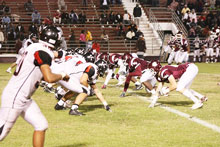Hockey is a notoriously rough sport, and no part of the body is more vulnerable to injury by that cold, hard ice or that fast-flying puck (not to mention a fellow player's fist or elbow) than the head. Concussions abound in the NHL, with more and more-many of them undocumented-happening every year. Former hockey star Keith Premeau, who suffered at least four concussions during his career, told the L.A. Times in 2011 that his career was cut short by his head injuries. "[T]here isn't a day that goes by that I don't sense I've damaged my brain," he said. This is sad, but not surprising, as concussion-related symptoms can last for years.
Student Athletes and 'Toughness'
 In the old days, athletes who were knocked out as a result of a blow to the head often got back into the game after a whiff of some smelling salts and mere minutes of recuperation. Today, there is much greater awareness of the potential severity and dangers of head injuries, even those that seem minor or cause no immediate symptoms. At high school and college level football, players are required to leave the field for at least one play if their helmet is knocked off. That's just one particular situation. Often, a player receiving a blow to the head will think he needs to say in the game to prove his toughness. Most coaches have come around to understanding the risk and necessary precautions but old mentalities can be hard to change. It may be worth drawing your students' attention to what is happening to big time athletes.
In the old days, athletes who were knocked out as a result of a blow to the head often got back into the game after a whiff of some smelling salts and mere minutes of recuperation. Today, there is much greater awareness of the potential severity and dangers of head injuries, even those that seem minor or cause no immediate symptoms. At high school and college level football, players are required to leave the field for at least one play if their helmet is knocked off. That's just one particular situation. Often, a player receiving a blow to the head will think he needs to say in the game to prove his toughness. Most coaches have come around to understanding the risk and necessary precautions but old mentalities can be hard to change. It may be worth drawing your students' attention to what is happening to big time athletes.
The NHL has a rule that stipulates players must stay off the ice after any sort of blow to the head. They are also required to go into what is termed the "quiet room," away from the rink, where they can be observed by medical professionals. The NHL is also stiffening the penalties for illegal head hits and trying to enforce stricter rules on the ice that will improve the safety of its players.
But a certain amount of head injuries seem inevitable, not only in the NHL, but in virtually any sport. Accidents do happen, after all, and often at great expense. In addition to being a moral concern, the preponderance of head injuries is also a financial concern for the NHL; the league is responsible for having the medical insurance in place that covers the costs resulting from the head injuries its players sustain, and is also vulnerable to lawsuits filed by the injured players.
A Workers Compensation Insurance Approach to Funding Medical Insurance
One possible solution for the NHL would be to set up a fund designed especially to cover the costs associated with its players' head injuries. This fund would exist separately from the league's existing healthcare and disability coverage. It would function very much like workers' compensation insurance. Worker's compensation insurance provides medical coverage to employees who are hurt on the job in exchange for those employees' relinquishment of their right to sue the company they work for. The NHL fund for head injuries would work in a similar fashion. Here's how:
- Players would have the option to pay into the head injuries coverage fund.
- Those who paid into the fund would receive extra benefits if they suffered any head injuries while playing.
- Those who paid into the fund would also waive their right to sue the NHL for their injuries.
This could be an effective way to limit the financial burden placed on the NHL by players' head injuries, and could also increase the quality and amount of care hurt players receive. Seems like a win-win situation-something pretty rare in the competitive world of hockey.
